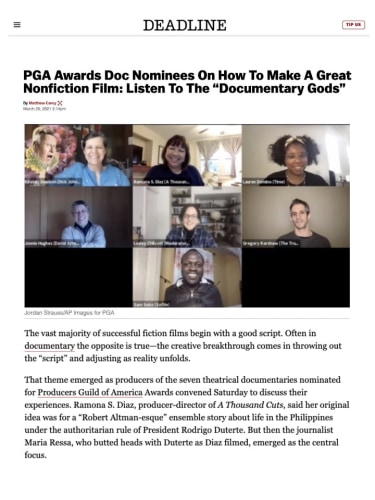PGA Awards Doc Nominees On How To Make A Great Nonfiction Film: Listen To The “Documentary Gods”
Deadline
03/20/2021
Back
By Matthew Carey
The vast majority of successful fiction films begin with a good script. Often in documentary the opposite is true—the creative breakthrough comes in throwing out the “script” and adjusting as reality unfolds.
That theme emerged as producers of the seven theatrical documentaries nominated for Producers Guild of America Awards convened Saturday to discuss their experiences. Ramona S. Diaz, producer-director of A Thousand Cuts, said her original idea was for a “Robert Altman-esque” ensemble story about life in the Philippines under the authoritarian rule of President Rodrigo Duterte. But then the journalist Maria Ressa, who butted heads with Duterte as Diaz filmed, emerged as the central focus.
“As a documentary filmmaker I’m really aware of the shifts in the story and how I need to pivot,” Diaz explained during the Zoom roundtable discussion. “Sometimes I get very attached to this idea of this ensemble cast but then when the story’s right in front of you, it’s calling you, and the documentary gods say, ‘This is your story,’ you have to listen to that.”
Sam Soko, producer-director of Softie, “listened” as his film expanded far beyond the original concept.
“The genesis of Softie was not in any sense supposed to be a feature film,” he shared. “We just wanted to make a five-minute video and put it on YouTube.”
Soko and fellow producer Toni Kamau were focusing on the Kenyan photographer-turned-activist Boniface “Softie” Mwangi and realized there was much more to explore than they first thought.
“We started seeing his life with his family,,” Soko recalled, “and it kind of became important to present the story of the family as well, particularly his wife.”
The PGA Award-nominated My Octopus Teacher revolves around the titular mollusk and naturalist Craig Foster, who is also the film’s producer.
“I hadn’t intended to be in the film in the beginning,” Foster noted. “But our wonderful team from three continents that put this film together—really a hive mind; if there ever was a collaborative process, this was it—persuaded me to be on camera and do this and really express my vulnerability and my story.”
One adjustment for Time producers Garrett Bradley, Kellen Quinn and Lauren Domino involved the very look of the film: black and white. The documentary tells the story of Fox Rich, a woman who worked for decades to win the release of her incarcerated husband, and weaves between the past and present, between footage recorded recently and much older material shot by Rich on VHS.
“For a very long time we played with the film being in color,” Domino revealed. “It didn’t really work because…the color grade of VHS is just so totally different that you’re like, ‘Oh, wait, now I’m in the past, now I’m in the future, now I’m in the present.’ The decision to go black-and-white was really to create a seamless element, that you can move through time…that it was like a river, flowing down the river through memory.”
Adjusting midstream in production doesn’t mean intense planning and groundwork isn’t required to bring off a successful documentary. Gregory Kershaw, who produced and directed The Truffle Hunters along with Michael Dweck, talked about the challenge of trying to document aged men and their dogs who scour Italy’s Piedmont region for coveted fungi.
“Everything in this world is a secret, even the identities of the truffle hunters,” Kershaw said. “Even before we could meet the truffle hunters we had to start building relationships within the community and it was kind of a situation where we would go to the trattoria owner and he would send us to the priest, who would send us to his cousin, and eventually we started meeting the truffle hunters. But that took a long time.”
A key challenge upfront for the makers of David Attenborough: A Life on Our Planet, about the renowned naturalist and conservationist, was to present Attenborough in a new and intimate way. Producer Jonnie Hughes settled on having his subject look directly into camera, using an Interretron-style teleprompter setup.
“It was new to [David]—he had never used it before,” Hughes said. “It worked straight away.”
Like My Octopus Teacher’s Foster, Kirsten Johnson had to balance both being the producer-director of Dick Johnson Is Dead and one of the film’s principal subjects. She constantly shifted between her role as director and participant, as in one scene where she staged a faux funeral for her aging father.
Johnson and her cinematic collaborators “delineated at what moments in the funeral was I only a daughter, greeting my father’s friends not with a camera in my hand, but only [as] a daughter,” Johnson explained. “But that would end and then [guests] would go in and be seated in the funeral and I could pick up a camera and be with my father, but then relinquish that directorial space and then become, again, just in my family.”
The PGA noted the panel discussion was pre-recorded a couple of weeks ago, which put it before the Oscar nominations were announced. Of this year’s seven PGA doc nominees, only two ended up earning Academy Award noms—Time and My Octopus Teacher.
Last year, the PGA’s nonfiction theatrical nominees more closely mirrored the Academy’s—four of the seven PGA contenders scored Oscar nominations—though it was Apollo 11, which did not secure an Oscar nomination, that went on to win the PGA Award.
Winners of the 32nd annual Producers Guild of America Awards will be revealed during a virtual ceremony on Wednesday, March 24.